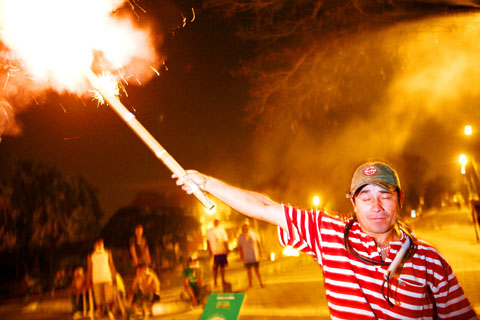Violent clashes have claimed eight lives in Bolivia and unleashed a three-way diplomatic crisis, with La Paz and Washington expelling each other’s ambassadors and Caracas kicking out its top US diplomat and the South American allies demanding that Washington stay out of their affairs.
Anti-government demonstrators fought backers of Bolivian President Evo Morales in the pro-autonomy east with clubs, machetes and guns on Thursday, killing at least eight people and injuring 20, authorities reported.
The demonstrators also seized natural gas fields, halting half of Bolivia’s gas exports to Brazil, its No. 1 customer, for nearly seven hours, the affected Transierra pipeline company said.

PHOTO: AP
“We’re going to tolerate only so much. Patience has its limits,” Morales told supporters on Thursday.
The Aymara Indian and former coca growers’ union leader has so far hesitated to mobilize the military, fearing major bloodshed.
Bolivian Vice President Alvaro Garcia announced a day of national mourning.
Meanwhile, US officials angered by Morales’ decision to expel Washington’s ambassador for allegedly inciting opposition protesters responded on Thursday by kicking out Bolivia’s envoy to the US.
“In response to unwarranted actions and in accordance with the Vienna Convention [on diplomatic protocol], we have officially informed the government of Bolivia of our decision to declare Ambassador Gustavo Guzman persona non grata,” US State Department Spokesman Sean McCormack said.
Diplomats declared “persona non grata” are generally given 72 hours to depart.
Venezuelan President Hugo Chavez, in a show of solidarity with his Morales, gave US Ambassador Patrick Duddy 72 hours to leave and announced the recall of Caracas’ ambassador to Washington.
“Go to hell, shit Yankees, we are a dignified people, go to hell a hundred times,” Chavez shouted at a political rally to thousands of roaring supporters dressed in red.
Chavez also once again accused the US of backing a coup to overthrow him, a claim the US has repeatedly denied.
“That’s enough ... from you, Yankees,” Chavez said during a televised rally, using an expletive.
Waving his fists in the air, he added: “I hold the government of the United States responsible for being behind all the conspiracies against our nations!”
“If there was an aggression against Venezuela there would be no oil for the people or for the government of the United States,” the former paratrooper said.
The conflict in Bolivia centers on Morales’ plans to amend the Constitution and redirect gas revenues. Bolivia’s conservative, energy rich eastern provinces oppose those plans, and on Thursday two weeks of protests turned violent as demonstrators stormed public offices, blocked roads and seized the gas fields.
Eight people were killed in a conflict between pro and anti-government bands outside Cobija, capital of the eastern province of Pando, said Sacha Llorenti, a deputy minister for social movements.

MORE VISITORS: The Tourism Administration said that it is seeing positive prospects in its efforts to expand the tourism market in North America and Europe Taiwan has been ranked as the cheapest place in the world to travel to this year, based on a list recommended by NerdWallet. The San Francisco-based personal finance company said that Taiwan topped the list of 16 nations it chose for budget travelers because US tourists do not need visas and travelers can easily have a good meal for less than US$10. A bus ride in Taipei costs just under US$0.50, while subway rides start at US$0.60, the firm said, adding that public transportation in Taiwan is easy to navigate. The firm also called Taiwan a “food lover’s paradise,” citing inexpensive breakfast stalls

TRADE: A mandatory declaration of origin for manufactured goods bound for the US is to take effect on May 7 to block China from exploiting Taiwan’s trade channels All products manufactured in Taiwan and exported to the US must include a signed declaration of origin starting on May 7, the Bureau of Foreign Trade announced yesterday. US President Donald Trump on April 2 imposed a 32 percent tariff on imports from Taiwan, but one week later announced a 90-day pause on its implementation. However, a universal 10 percent tariff was immediately applied to most imports from around the world. On April 12, the Trump administration further exempted computers, smartphones and semiconductors from the new tariffs. In response, President William Lai’s (賴清德) administration has introduced a series of countermeasures to support affected

CROSS-STRAIT: The vast majority of Taiwanese support maintaining the ‘status quo,’ while concern is rising about Beijing’s influence operations More than eight out of 10 Taiwanese reject Beijing’s “one country, two systems” framework for cross-strait relations, according to a survey released by the Mainland Affairs Council (MAC) on Thursday. The MAC’s latest quarterly survey found that 84.4 percent of respondents opposed Beijing’s “one country, two systems” formula for handling cross-strait relations — a figure consistent with past polling. Over the past three years, opposition to the framework has remained high, ranging from a low of 83.6 percent in April 2023 to a peak of 89.6 percent in April last year. In the most recent poll, 82.5 percent also rejected China’s

PLUGGING HOLES: The amendments would bring the legislation in line with systems found in other countries such as Japan and the US, Legislator Chen Kuan-ting said Democratic Progressive Party (DPP) Legislator Chen Kuan-ting (陳冠廷) has proposed amending national security legislation amid a spate of espionage cases. Potential gaps in security vetting procedures for personnel with access to sensitive information prompted him to propose the amendments, which would introduce changes to Article 14 of the Classified National Security Information Protection Act (國家機密保護法), Chen said yesterday. The proposal, which aims to enhance interagency vetting procedures and reduce the risk of classified information leaks, would establish a comprehensive security clearance system in Taiwan, he said. The amendment would require character and loyalty checks for civil servants and intelligence personnel prior to